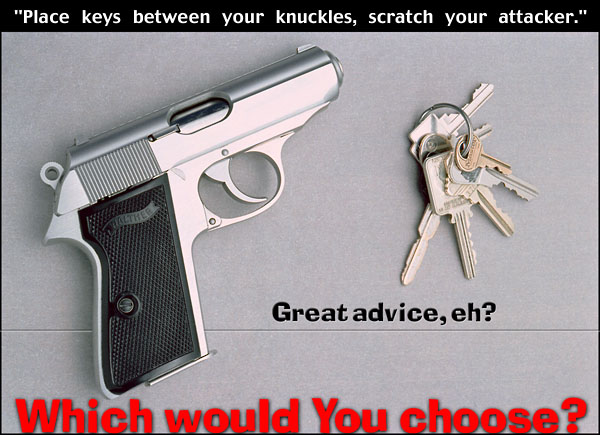Op-Ed: Taking aim at fear with a .22-caliber
How tragic that it takes being victimized for some liberals to "wake up" on the importance of legalized self-defense, and how tragic that this woman believes a marriage license can protect her.
June 2, 2004
Newsday.com
By Susan Cheever
The afternoon of the day I was attacked, I drove into the nearest town and bought a gun. In the report I had already filed with the police, I described the stranger who broke into the house while I was taking a shower. "Go away," I screamed. He told me to shut up.
After a kicking, howling struggle, which took us from the bedroom to the living room, he ran off. He was gone, but I felt panicky and powerless. I had seen into the heart of reality and been permanently changed. What kind of fool would be nonviolent in a violent world? I laughed at my old liberalism, my empty prating about the evils of violence and the value of human life. The man who attacked me didn't have those scruples, and I had lost mine in a heartbeat. If I hadn't fought back violently, I believe I would have been raped, and I might have been killed.
Click on the "Read More..." link below for more.
I picked out a heavy target pistol, a single-action West German .22-caliber with a long barrel and a wooden handle; the moment I held it, I started to feel better. I showed my driver's license, signed my name and began to have what would be months of fantasies about what I would do to the stranger if he returned. I would blow his head off. He would plead with me - as I had pleaded - and I would wipe out his pleas with a .22 long. I understood the healing power of revenge.
Before the attack, I thought it couldn't happen to me. Afterward, I lived in fear, suspecting all strangers, double-checking the locks and refusing to go out after dark.
Every afternoon, I walked down to the local dump and set up cans for target practice. At first my marksmanship was as crazy as I felt, but I slowly found the shooting position - a Kojak-style two-handed grip - that worked best. I began to hit the mark. I conjured up the image of my attacker. Then I blew him away. For a moment, I felt safe and powerful, but by the time I cleaned the gun an hour later, the fear came flooding back. I moved from the house where it had happened. I moved again. When I told friends about the gun, some argued. I lost some friends. I kept the gun.
 align="right">
align="right">
An estimated 17 million women in the United States own guns, according to Caitlin Kelly's new book, "Blown Away: American Women and Guns" (Pocket Books). Women are the fastest growing group of sport hunters; teenage trap shooting has quadrupled nationwide since 2001, and 4-H clubs have added shooting to knot-tying and animal husbandry.
But a study in the magazine Women & Guns shows that more than 80 percent of women who own handguns keep them out of a concern for personal safety. Statistics show a dramatic drop in crime almost everywhere, but women are still at an unacceptable risk. More than a third of women in this country will be violently assaulted, raped or robbed. Three women are killed every day, 90 percent of them by their male partners.
"Guns kill, but guns protect," says one gun owner in Kelly's fascinating, balanced book, whose interviewees range from preppy students to seasoned police officers. "They're an enormous equalizer between the weak and the vicious."
Guns have an ugly, tragic side. In the wrong hands, they have caused countless unnecessary deaths, and they have shattered families and communities. The massacre at Columbine could not have happened without guns. Fifty percent of gun deaths are suicides. In the absence of guns, people don't get shot. It's as simple as that. The Second Amendment of the United States Constitution guarantees us the right to bear arms, but these arms have become objects of intense political contention between those who favor stricter gun controls and those who favor more personal freedom.
After I got married again and had children, I got rid of my bullets and gave away the gun. Although I would kill to protect my kids, it felt dangerous to have a gun in the same house with them. They were so precious; it was so deadly. By that time, I had also moved to Manhattan, where most apartments are protected by deadbolts and chains.
I read wheelchair-user and former Marine Andre Dubus' electrifying essay in "Meditations From a Movable Chair" (Vintage, 1999) about why he had given up his gun. "I gave up answers that are made of steel that fire lead," he wrote, "and I decided to sit in a wheelchair on the frighteningly invisible palm of God." On good days, I understand that. On bad days, when I am alone in the country or when my doorbell rings late at night, I wish I had a gun again.
- 1316 reads

